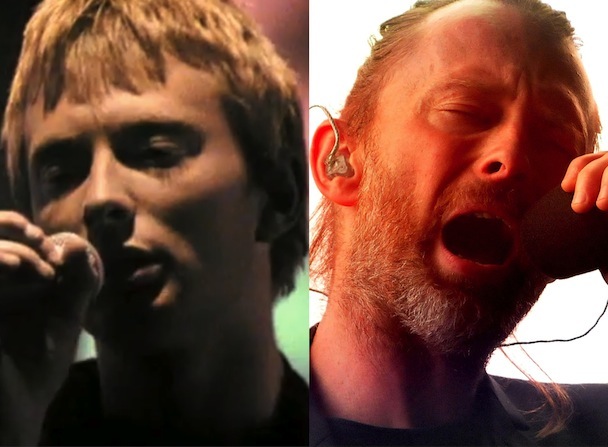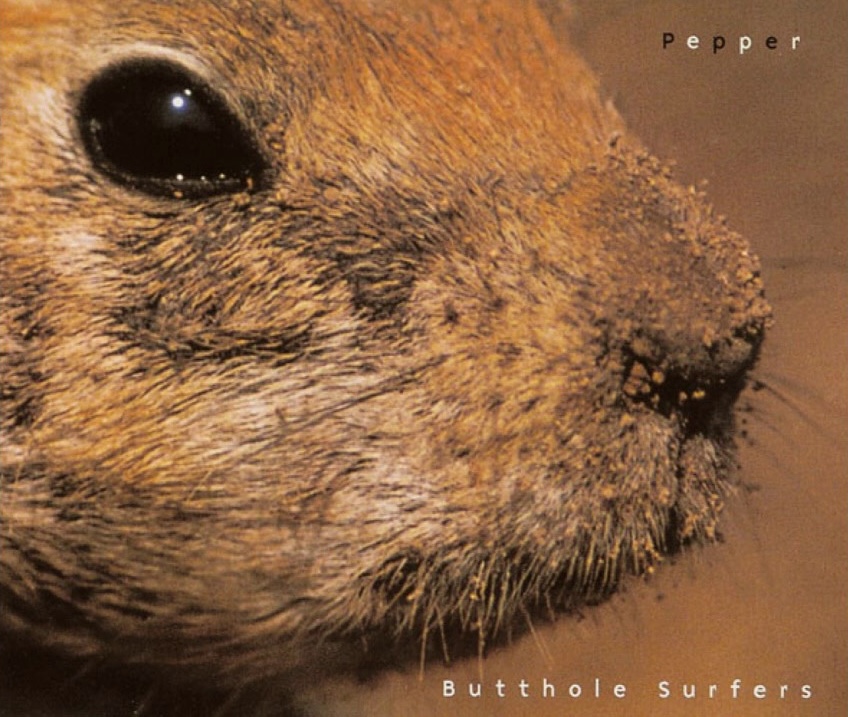The most memorable moment of my junior year Homecoming night wasn't the dinner (who knows where), the dance (in my high school gymnasium, I think?) or the date (though I hope she's doing well these days). It came after all that, when I got home, sprawled out on the living room floor, rewound the VCR and -- finally! -- cued up Radiohead's performance on Saturday Night Live. This was October 2000. Kid A had been out less than two weeks, and my obsession with the band was in full bloom. After falling hard for OK Computer that spring, I spent my summer wailing along to The Bends in my '88 Camry, scouring Napster for every B-side or rarity in the Green Plastic archives and gobbling up all available information about the new record. In the waning minutes of Oct. 2, a friend and I lined up outside our local record shop to purchase Kid A at midnight and stayed up late dissecting it over AIM. The next day I forced all my classmates to listen to it on repeat. Now this band that had so entranced me, the band that would serve as my gateway to vast new galaxies of music, was appearing on SNL, one of the few institutions whose clout seemed universal. This was the apotheosis, their moment to parade their incalculable splendor on pop culture's most prominent stage.
They did not disappoint. Colin Greenwood's insistent bassline announced "The National Anthem," and they quickly built up an urgent swirl of chaos around it -- Jonny Greenwood hunched over noise boxes and conjuring ghost moans from his Ondes Martenot, Ed O'Brien bleeding feedback and oscillations from his Stratocaster, Phil Selway holding it all together even as a brass band skronked free-jazz dissonance directly into his ear. This was madness, but it all seemed quaint compared to the vertically challenged fellow who appeared to be having a nervous breakdown at the eye of the storm. Thom Yorke paced in circles, convulsed, strangled his microphone, stomped his foot, babbled nonsense under his breath. Eyes glued shut, countenance locked into a sourpuss snarl, he deployed his radiant vocal chords in sharp stabs of pre-9/11 Orwellian paranoia: "Everyone has got the fear/ It's holding on!" As the second verse segued into more rolling cacophony, Yorke gave himself over to a tantrum/seizure every bit as harrowing as the music, pausing only to lift his hands with the derangement of an asylum escapee turned itinerant preacher. In the song's final disintegrating moments, he bitterly scowled at his audience, then leapt with arms outstretched to silence the noise barrage, a petulant man-child conducting his skewed symphony. I desperately wanted to be him and not to be him. Not sure I'll ever sort that one out, but I won't forget it either.
Yorke left his stamp on millions of us, and he's not done yet. Ten albums, hundreds of concerts, and countless haircuts into his career, he's as active as ever, juggling multiple bands, inhabiting multiple cities, championing multiple causes. He wields astounding influence across disparate spheres, sometimes reluctantly, sometimes unwittingly. When he talks (or even types), people listen. When he makes a record, it seeps into the cultural DNA. His singing voice has inspired so much beleaguered thomfoolery, though thankfully that's mostly over now. (Yet still the post-Vedder warblers persist.) Somehow, this freakish, whimpering miserablist from Oxford became the most revered rock star of his generation even as he alienated large swaths of his fan base, fervently avoided the spotlight and sought to dispel mythic celebrity narratives at every turn. This is a man who wrote a song called "How To Disappear Completely" and meant every word of it. Thankfully, he doesn't look to be disappearing anytime soon, but convenient chronology suggests a look back is in order anyhow.
Four days ago marked the twentieth anniversary of Radiohead's debut album, Pablo Honey. Today, Yorke's new band Atoms For Peace release their debut, Amok. The gulf between the two records is almost unimaginable -- the former, an overcooked, underseasoned pub platter of anxious guitar-pop bangers and mash; the latter, a soft winter blanket knit together from spidery skitters and synth smears -- the surest shorthand for just how much ground Yorke has covered during two decades in the public eye. The albums' only common thread is that unmistakable voice, and even that has undergone a graceful deflation over the years. We can debate endlessly about whether Amok is a treasure trove or a frivolous dalliance (I'm leaning toward the latter at the moment), but regardless of whether you connect with Yorke's music these days, it's hard to miss the sound of him enjoying himself. Even for such gentle, whispery music, Amok is an appropriate title; Yorke is running free with nothing left to prove, light years removed from the sniveling headcase who wrote "Creep."
Not that "Creep" is anything to be ashamed of. Most bands would be ecstatic about a career that amounted to nothing more than "Creep." Let us not understate how fondly we would look upon Radiohead's prophetically mopey falsetto bomb had it been relegated to the Buzz Bin of history along with "In the Meantime" and "Possum Kingdom." But it wasn't, partially because in 1995 The Bends came along to establish Radiohead as legit guitar titans and Yorke as more than just a powerful pair of lungs, but mostly because in 1997 OK Computer catapulted the band into the pantheon instantly. (They didn't even have to pass go on their IMF-issued voodoo economics Monopoly board.) Haters gonna hate, but that record's timeless brilliance was evident from the beginning, which makes sense for music with its tentacles stretched so effortlessly into both past and future. They were in a creative sweet spot that simply can't be forced; even the outtakes, compiled on the Airbag / How Am I Driving? EP, comprise one of 1998's greatest records. Rarely does music so rapturously meld reverence for the classics, enthusiasm for the cutting edge, unbridled pathos and purebred songwriting swagger. Sure, OK Computer is the record that launched a thousand Coldplays, but it also launched innumerable souls into the stratosphere. Everybody wanted a piece of Radiohead's grandeur; some were foolish enough to think they could replicate it. No surprises there.
Surprises, though, would be one of Yorke's great contributions to music history. After the pressures of touring behind OK Computer reduced Yorke to a walking ulcer (as chronicled in Grant Gee's documentary Meeting People Is Easy), Radiohead retreated to the studio and came out with the audio equivalent of a digital middle finger: No discernable guitars until track 4; Yorke's once-soaring vocals mostly caged, sliced and garbled; the icy electronics that loomed at OK Computer's fringes now frosted over everything. Like Nirvana's intentionally abrasive In Utero, it seems a lot less radical in hindsight, but that's partially because it was just as masterful as what came before it and arguably even more influential. If OKC established a new template, Kid A was an inspired reminder of the virtues of template-smashing. Still, 2001's Amnesiac (culled from the Kid A sessions) and 2003's Hail to the Thief suggested Radiohead had settled into its new postmillennial identity, so when the guitar-centric, user-friendly In Rainbows materialized out of nowhere in 2007, the back-to-basics move was the least expected.
Of course, the biggest shockers with In Rainbows were related to its method of delivery. The album was announced just 10 days before its release date with no advance singles or press, just a 24-word note. It would be released without assistance or interference from a record label. Most paroxysmal: Listeners could name their own price for the digital version or shell out about $80 for an elaborate deluxe vinyl and CD "discbox" with a bonus disc of extra music plus the download. As a proud owner of said discbox, I can assure you those $80 were well spent, but that's really a footnote. More centrally, the digital download arrived in everyone's inbox at once, so this forward-thinking approach became a temporary road back to the old-fashioned experience of a fan base discovering a band's new album together on release day, the difference being that much of the dialogue was now on blogs and Facebook rather than at the record store. (Sorry, Jack White; oh good, you guys made up.) As for the pay-what-you-want model, it sent ripples throughout the music industry, even if in practical terms it was more of a statement against the major label system than a workable solution for artists. After all, even In Rainbows ended up on Best Buy racks a few months later via TBD Records. But pointing out a problem is a necessary step to fixing a problem, and Radiohead's stunt undeniably shook up people's understanding of the value of music, a subject that seems increasingly relevant as bands figure out how to scrape their way to survival.
Maybe In Rainbows' distribution scheme was a grand gesture that barked harder than it bit, but Yorke has used his pedestal to contribute in concrete ways too. Radiohead has played Tibetan Freedom Concerts and Amnesty International benefits, helping to raise hundreds of thousands. In 1999 Yorke voiced his support for Jubilee 2000, the movement to convince the world's richest nations to forgive the poorest nations' debts; the U.S. Congress eventually committed hundreds of millions of dollars to debt relief. In 2003, Yorke's op-ed for The Guardian called for fair trade measures that would lift millions out of poverty in developing countries. He has vehemently argued against nuclear power and in favor of clean energy. His environmentalism includes work with the 10:10 program and Friends of the Earth's The Big Ask. Not to be hypocrites, Radiohead commissioned a study by the group Best Foot Forward to drastically reduce carbon emissions on their 2008 tour and adopted an energy efficient LED display. Though a 2001 Uncut profile paints Yorke as an insufferable Puritanical asshole who ought to appreciate his fame and loosen up a bit, to me his legendary dickishness has always seemed more like the frustration of a shy retirer with the weight of the world on his conscience. He was genuinely compassionate and deeply troubled after the 2012 stage collapse in Toronto that claimed drum tech Scott Johnson's life. Similarly, I find his disgust for self-indulgent interview questions and celebrity narratives refreshing, not fun-sucking. His bit about backing away through a hedge when someone on Reddit asked him about his songwriting process was high comedy. It's good to see a singer who isn't willing to play along with the entertainment industry's fraudulent song and dance or intent on broadcasting himself as God's gift to mankind.
Rather, Yorke has always seemed slightly embarrassed of his success and far keener on hyping up whichever past or present heroes are informing his songwriting these days. His albums broadcast his tastes clearly enough; you can trace a line from Pablo Honey to now that includes R.E.M., Pixies, Jeff Buckley, DJ Shadow, Bjork, Aphex Twin, Can, Kraftwerk, Anti-Pop Consortium, Four Tet, Grizzly Bear, Liars, Caribou, Flying Lotus and Burial. Yorke is exceptionally good at chewing up such leftfield sounds and spitting them back out in his own image. His ability to make avant-garde music palatable to the masses is one of the reasons Radiohead is among the ultimate musical gateway drugs. But the guy is never shy about citing his influences, and he's gone out of his way to spotlight many of those names as tourmates or collaborators, sometimes with glorious results. Even when he's not behind the decks, Yorke's entire public life has essentially been a DJ set.
Still, all that barely matters to a kid in front of the TV witnessing some transcendent stroke of genius. (Did I mention how incredible "Idioteque" was on SNL as well? Because it was incredible.) What mattered most then, and what sticks with me now, is the sheer kinetic force Yorke can summon whenever he pleases, in whichever context he likes, be it drowning in claustrophobic electronics or gliding over a simple, spare acoustic. I doubt we'll ever witness his combination of awe-inspiring power, influence and adoration again. That's partly because the monoculture that helped elevate Radiohead to no-questions-asked festival headliners has dissolved, and partly because today's microscopic hype cycle gives bands less room to evolve gracefully like Radiohead did after Pablo Honey (and makes it harder to notice if they do make a leap once the hype machine leaves them behind). But mostly it's because Thom Yorke is just that great, a legit once-in-a-lifetime talent. In X-Men, when Cyclops takes off his visor, volatile beams of electromagnetic energy shoot from his eyes, capable of leveling buildings and blasting right through human beings. Something similar happens when Thom Yorke opens his mouth to sing; in an interstellar burst, he's back to save the universe.






